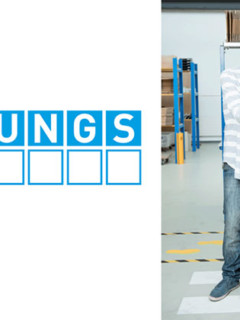Would you let strangers into your home when you are not at home?
If you now answer “absolutely not”, this corresponds to the opinion of (only!?) 77% of all Germans: In a survey (civey) with the topic “alternative parcel delivery”, the vast majority agreed that the parcel delivery man has no business in your home while you are away.
Alternative delivery options desired
But: We already want the parcel. And preferably on the same day (35% would like to use this service, another 11% have already used it) or at least on the next working day.
Since very few of us can wait for the parcel at home during the day, the parcel deliverers have to find new ways. City dwellers in particular are dissatisfied with parcel delivery. While in rural areas the options “neighbour” or drop-off terrace are widely accepted alternatives, in the city this is not an option for obvious reasons. Packing stations are practical, but are not the top solution in the eyes of consumers either.
Packing stations? Ok. But not ideal!
“The so-called Packstations work on the locker principle: DHL currently supplies around 3,400 such Packstations (at railway stations, supermarkets or other frequented locations). Hermes, DPD and GLS are working together on a joint system called “Parcellock”.
Problem: Often the capacities are used to capacity because parcels are picked up very late or even not at all!”
The parcel service providers have a vested interest in solving this problem for the end consumer: While the satisfaction score (from -100 “not at all satisfied” to +100 “very satisfied”) was +37 a year ago, it has fallen further this year, to +30 points average for the industry.
“A good third of respondents express interest in very fast delivery. Thus, 35 percent of online shoppers say they would like to use same-day delivery, 11 percent have already used so-called same-day delivery. Same Hour Delivery is still something 28 per cent would like to use, only 5 per cent have already done so.” (bitcom.org: What customers expect from parcel services)
Who is being warned off here? The deliverers or the shop?
Interestingly, this seems to be mainly the problem of the deliverers at the moment. If something goes wrong with the delivery, this does not automatically fall back on the shop. Not yet. The enlightened customer wants to have a say in the type of delivery service. Some shops therefore offer the customer a choice of two or more service providers during the purchasing process. The “wrong” parcel delivery company has certainly already been the reason for one or two shopping basket cancellations: unreliable, inflexible, complicated returns process.In order to counteract this and to remain competitive, the various delivery companies are working on a wide variety of solutions. In addition to the flat key for parcel carriers (Amazon is planning in the USA to give parcel carriers access to the flat via a code on an app), which 77% of respondents reject (see above), delivery by drone, the company’s own parcel box in the front garden or the delivery robot will probably not be the 100-point solution either. Too many disadvantages, too much effort.
Car boot delivery
Another concept is currently being pursued by Volvo, Smart and now VW: the once ridiculed idea of the boot as a parcel station is slowly becoming reality. In 2019, VW plans to offer the “We Deliver” service in selected production models. And the idea is no longer necessarily in its infancy. Etailment.de shows who is already flirting with this idea and who is already participating. So Germans would rather let the parcel delivery man into their car than into their home. However, the scepticism of consumers must also be countered here. 68% of those questioned in a survey (PwC) can “definitely not” imagine such a delivery.
“With every new delivery, the delivery person takes the parcels that are in the boot and leaves a receipt.” (FAQ from DHL on the subject of “car boot delivery”)














